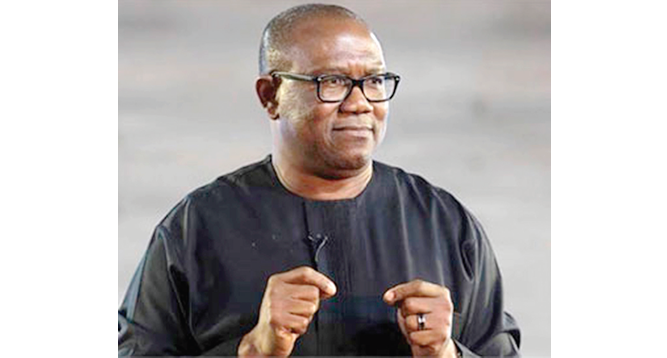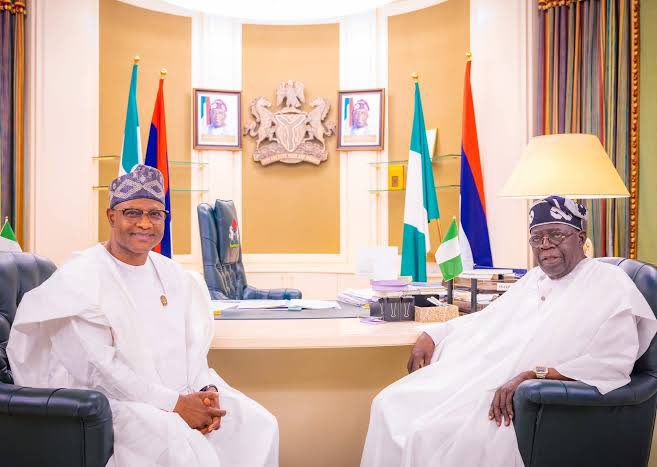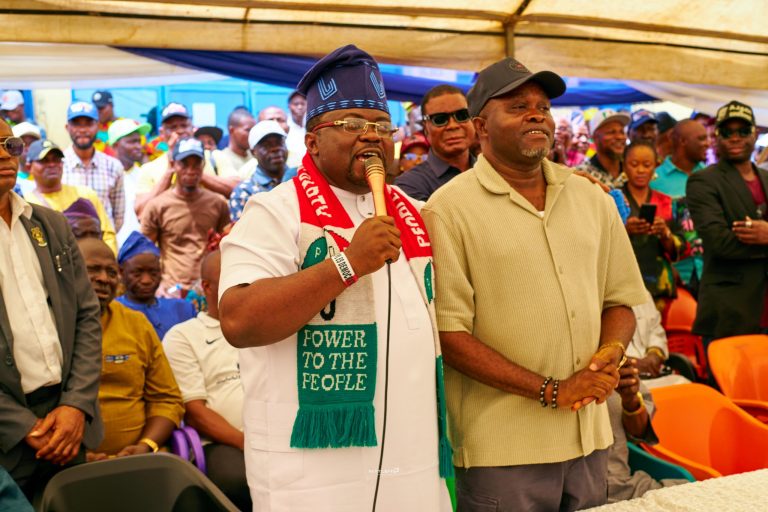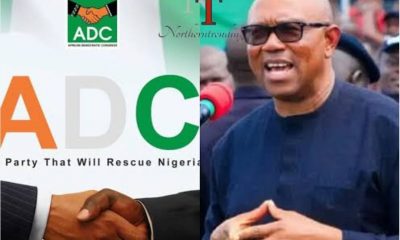Politics
2023 election: Peter Obi reveals agenda for the Northern region during Arewa session

2023 election: Peter Obi reveals agenda for the Northern region during Arewa session
Peter Obi, Labour Party presidential candidate has unveiled his plans for the country and in particular, Northern region if elected president of country in 2023.
Obi made the revelations during his talk at the Arewa Joint Committee Interactive Session in Kaduna.
The former Anambra State governor noted that improving security would be his first priority, while also uniting the country, boosting agriculture and education.
According to the former Anambra State governor, “We will offer immediate and decisive long-lasting and permanent-effect resolution of all security challenges in the North.
“Ensure that farmers return to all farmlands for the 2023 farming Season. We will make Nigeria’s arable land in the North her new oil and gold;
“As part of our Marshall Plan for Education, we will foster Federal intervention in education at all levels in the North and partnership with State Governments and international organizations in order to improve access to affordable and quality education at all levels.”
He added that his administration will “ensure very adequate representation in government, equitable appointments especially in the Security and Economic Sectors.”
Mr Obi noted that he will also work on reviving the “moribund cotton and textile industries” and “ensure very generous deployment and allocation of economic and social projects and infrastructure in the North.”
Read Mr Obi’s full speech below:
It is an honour to return to the City of Kaduna and to participate in the Arewa Joint Committee Interactive Session, and rub minds on some fundamental issues germane to the future of Nigeria.
I thank the leadership and stakeholders of the Sir Ahmadu Bello Memorial Foundation for their gracious invitation.
I wish to preface my remarks by setting out our mission and vision. We are all Nigerians. I am a Nigerian running for the Nigerian Presidency to serve every Nigerian. I continue to insist on a show of respect for every candidate, ethnicity, religion and person.
The mission and vision of the incoming Obi-Datti Administration is to give full expression to our democracy by moving our country from consumption to production; we shall achieve this by giving primacy to implementing the 17 Sustainable Development Goals (SDGs).
Our dear country today has become a shadow of itself. Indeed, there is evidence that Nigeria exhibits two known indices of a failed state; parlous economy and loss of territory and emergence of ungoverned spaces.
The purpose of politics and governance is to generate economic and social progress for the citizens in larger freedom. But the status quo is the reverse. This is more so here in the North, where poverty, unemployment and insecurity are the new normal.
The North has the highest number of out-of-school children in the world. It has highest number of school kidnappings in the world. The North also has the highest number of internally displaced persons (IDPs) in Nigeria.
The vast agricultural lands of the north -the so-called food basket of the nation stand desolate and abandoned. This situation is painful and needs to be fixed. Great nations are built through visionary policies, programmes and projects, anchored on the people.
This was always the hope and wishes for Nigeria by our founding fathers. Sadly, things changed. Our leaders became selfish, myopic and stopped listening and caring for the common man. Bad leadership, divisive rhetoric, and impunity became the norm.
Nigerians have suffered; they have lost jobs, and lost their farms and herds and their trust in our leaders. That narrative must change.
The Nigerian people want solutions to the many problems confronting them. After all economic prosperity for all is an all important aspect of a successful leadership, there is hope. We know this for sure. A new Nigeria is Possible.
But we must return to dreams of our founding fathers to create an egalitarian society. The Nigeria we seek will be a United and Secure Nigeria that symbolizes the spirit, letters, and exhorting ethos of our national anthem – “one nation bound in freedom, peace and unity” where “peace and justice shall reign.” As we seek to come to power in May 2023, we are aware of the daunting array of domestic and external challenges confronting our dear nation, and we are fully prepared to lead from the front.
We are cognizant of the domestic policy challenges that have accumulated over time; and that the lack of adequate public policy responses has made them worse, with a devastating impact on national unity, social cohesion, public trust in government, and economic performance.\\We have a grasp of prevailing challenges.
Nigeria’s needs and unmet needs are very huge. Yet hunger, insecurity, poverty and deprivation know no tribe, religion or gender.
With all sense of urgency, we will, pursue aggressively policies programmes and projects to enhance the productivity and competitiveness of all the sectors of the Nigerian economy.
For the North we will do the following:
a, We will offer immediate and decisive long-lasting and permanent-effect resolution of all security challenges in the North;
b, Ensure that farmers return to all farmlands for the 2023 farming Season. We will make Nigeria’s arable land in the North her new oil and gold;
c, As part of our Marshall Plan for Education, we will foster Federal intervention in education at all levels in the North and partnership with State Governments and international organizations in order to improve access to affordable and quality education at all levels;
d, Ensure very adequate representation in government, equitable appointments especially in the Security and Economic Sectors;
e, Incentivize the resuscitation of the moribund cotton and textile industries; and full exploration of the cattle economy value chain, notably the $75b global hide and skin economy. Nigeria’s share of the global industry is envisaged to generate over $1bn by 2025; and finally,
f, We will ensure very generous deployment and allocation of economic and social projects and infrastructure in the North – with keen attention to Roads, Energy, Power, and Dams- and Solar energy from Sunlight.
In closing, let me say this on record. I have come in peace to develop, to secure, and to unite, and I will do so with every commitment to the growth of Nigeria, as one great and united country.
We shall pay as much attention to the development of the North as to the development of all other parts of the country; but with much greater emphasis on the development of the Agricultural resources.
The North remains where the biggest ad sustainable wealth of this great Nation lies.
If elected President, I shall govern with the fear of God and with all good conscience and intent. The Constitution and the rule of law will always prevail. I thank you for your kind attention. May Almighty God bless you all and bless Nigeria.
Politics
Gov. Dauda Lawal commissions projects in Anka LGA, Commits to Sustainable Development

Gov. Dauda Lawal commissions projects in Anka LGA, Commits to Sustainable Development
The Executive Governor of Zamfara State, Dr. Dauda Lawal, has reiterated his administration’s steadfast commitment to guiding Zamfara State towards sustainable development by inaugurating and initiating a series of pivotal projects in the Anka Local Government Area.
Among the key undertakings announced are the comprehensive reconstruction and modernization of the Emir of Anka’s palace, signaling a revitalization of traditional leadership; the initiation of work on the crucial Anka–Abbare Road, which is expected to significantly improve connectivity; and the construction of a new Local Government Secretariat.
Additionally, the projects encompass the establishment of dedicated offices for the Hisbah Commission and the Community Protection Guards, alongside the reconstruction of the Safe School in Anka, emphasizing the administration’s focus on enhancing educational infrastructure.
During the commissioning event, Governor Lawal highlighted that these projects are a fulfillment of commitments made during his campaign, aimed at transforming the local landscape by improving infrastructure, stimulating economic growth, bolstering public service efficiency, and enhancing the capacities of security agencies. He called for a collective effort from the community to ensure proper maintenance of these facilities, underscoring the shared responsibility in preserving public assets.
Governor Lawal shared that similar projects have also been inaugurated in Tsafe, with plans for upcoming projects in Kaura Namoda, Moriki, Bungudu, Bukkuyum, and Zurmi, all expected to be completed and inaugurated by the year’s end. This ambitious timeline reflects the administration’s urgency in addressing the development needs of various regions within the state.
In his remarks, the governor urged residents and local traditional institutions to collaborate closely in maintaining the newly commissioned structures and supporting the overarching objectives of his administration. “I stand here in Anka today to honor our commitments to the people of Anka Local Government and all of Zamfara State. The official opening of the new palace for the ‘Sarkin Zamfaran Anka’ and the Zamfara State Council of Chiefs is a significant milestone that wraps up today’s agenda,” he stated.
Governor Lawal emphasized the strategic importance of the Anka–Abbare Road, describing it as a critical artery that will not only enhance access to remote areas but also stimulate economic activities and generate multiplier effects throughout the local economy. He articulated the necessity of providing a conducive work environment for civil servants, affirming that the new local government secretariat and dedicated offices will significantly contribute to strengthening law and order within the state.
“Education is the cornerstone of any thriving society. Our focused initiatives are oriented towards fostering a safe, secure, and supportive environment for our students. I am also proud to announce the completion and commissioning of the reconstructed SAFE School Anka today,” he remarked, reaffirming the administration’s dedication to education.
The governor further noted that the commissioning of the Emir’s Palace serves to restore the historical prominence of traditional institutions, which he regards as pivotal custodians of the region’s culture and heritage. He underlined the administration’s awareness of the invaluable role that these institutions play in fostering the state’s growth and emphasized the necessity of aligning development projects with cultural values.
In conclusion, the governor mentioned that after the successful commissioning in Anka and Tsafe, future projects in Kaura Namoda and Moriki will follow suit, while those in Bungudu, Bukkuyum, and Zurmi remain on track for completion and official commissioning before the year concludes.
news
GEN CHRISTOPHER GWABIN MUSA SUPPORT INITIATIVE HAILS GOVERNOR UBA SANI’S APPOINTMENT AS RENEWED HOPE AMBASSADOR

GEN CHRISTOPHER GWABIN MUSA SUPPORT INITIATIVE HAILS GOVERNOR UBA SANI’S APPOINTMENT AS RENEWED HOPE AMBASSADOR
The Gen Christopher Gwabin Musa Support Initiative (GCGMSI) has extended its warm congratulations to His Excellency, Mallam Uba Sani, the Executive Governor of Kaduna State, following his recent appointment as a Renewed Hope Ambassador and Deputy Director-General for Party Outreach, Engagement, and Mobilisation by the All Progressives Congress (APC).
This felicitation was formally conveyed in a statement signed by the Initiative’s Convener, Ibrahim Dahiru Danfulani, Sadaukin Garkuwan Keffi/Betara Biu, and disseminated to the press.
The statement highlighted that the Grand Patron of the GCGMSI, His Excellency General Christopher Gwabin Musa, OFR, Minister of Defence of the Federal Republic of Nigeria, received the news of the appointment with great pride but without surprise. According to the statement, General Musa expressed unwavering confidence in Governor Uba Sani’s proven capability and salient leadership qualities, affirming that the Governor is eminently equipped to deliver on every task entrusted to him.
The Grand Patron further extended profound appreciation to the President and Commander-in-Chief of the Armed Forces, His Excellency Asiwaju Bola Ahmed Tinubu, GCFR, for recognising and finding Governor Uba Sani worthy of this critical national assignment. The appointment, which takes effect immediately, was made by the President in his capacity as the leader of the APC, citing the Governor’s exceptional organisational abilities and strategic acumen.
In his new role, Governor Sani is tasked with working in close collaboration with the Director-General of the Renewed Hope Ambassadors and the party hierarchy, including the National Chairman of the APC. His primary mandate is to ensure harmony, inclusiveness, and strategic coordination across all levels of the party’s mobilization and engagement architecture, a vital function for advancing the political agenda.
Demonstrating its commitment to national service and effective governance, the GCGMSI, under the direct directive of its Grand Patron, General Musa, has officially mobilised its formidable structure. The Initiative has pledged the full deployment of its extensive network, seasoned personnel, and robust operational framework to assist and support Governor Uba Sani in the successful execution of his new responsibilities.
The Gen Christopher Gwabin Musa Support Initiative, renowned for its disciplined organisation, widespread grassroots penetration, and capacity for large-scale civic mobilisation, stands ready as a pivotal force. This move underscores the GCGMSI’s pivotal role as a key support system for national development initiatives and its unwavering dedication to fostering unity and progress under the Renewed Hope agenda.
Politics
Oyo 2027: Ajadi Says PDP Will Retain Power

Oyo 2027: Ajadi Says PDP Will Retain Power
…..Tasks PMS To Remain United, Peaceful
A leading People’s Democratic Party (PDP) governorship aspirant in Oyo State, Ambassador Olufemi Ajadi Oguntoyinbo, has urged the people of Oyo State to remain steadfast, saying they will continue to enjoy good governance because the PDP will produce the next governor in the 2027 general elections.
Ajadi, who made this known while addressing transport unions under the Park Management System (PMS) at their headquarters, New Garage, Ibadan, on Tuesday, urged the park managers to remain united and maintain the love and peace currently prevalent among them.
According to him, “My advice to the Park Managers and the commercial drivers in Oyo State is that they should continue the love and peaceful attitudes. They should remain united. They should not ‘scattelegs’.
“Don’t let anybody deceive you, remain steadfast. Let me assure you that our party, the PDP, will produce the next governor come 2027,” Ajadi said.
He said he came to the PMS headquarters to meet with transporters and park managers to inform them of his aspiration to serve the people of Oyo State as governor come 2027.
“Today I joined my people, the park managers in Oyo State, to familiarize myself with them and inform them of my intention to serve the people of Oyo State as the next governor by the Grace of God.”
On the plans for the transporters, Ajadi said he first wants to change the look of the City Cabs, which will be done in collaboration with the Park Management System.
He also plans to increase the number of Mass Transit buses and make them available in all locations of the State.
He said the Mass Transit buses will operate in partnership with the Park Managers.
Ajadi, who commended Governor Makinde on the newly established bus terminals in the State, said his government will ensure adequate usage of the facilities.age of the facilities.
-

 celebrity radar - gossips6 months ago
celebrity radar - gossips6 months agoWhy Babangida’s Hilltop Home Became Nigeria’s Political “Mecca”
-

 society6 months ago
society6 months agoPower is a Loan, Not a Possession: The Sacred Duty of Planting People
-

 society5 months ago
society5 months agoReligion: Africa’s Oldest Weapon of Enslavement and the Forgotten Truth
-

 news6 months ago
news6 months agoTHE APPOINTMENT OF WASIU AYINDE BY THE FEDERAL GOVERNMENT AS AN AMBASSADOR SOUNDS EMBARRASSING









